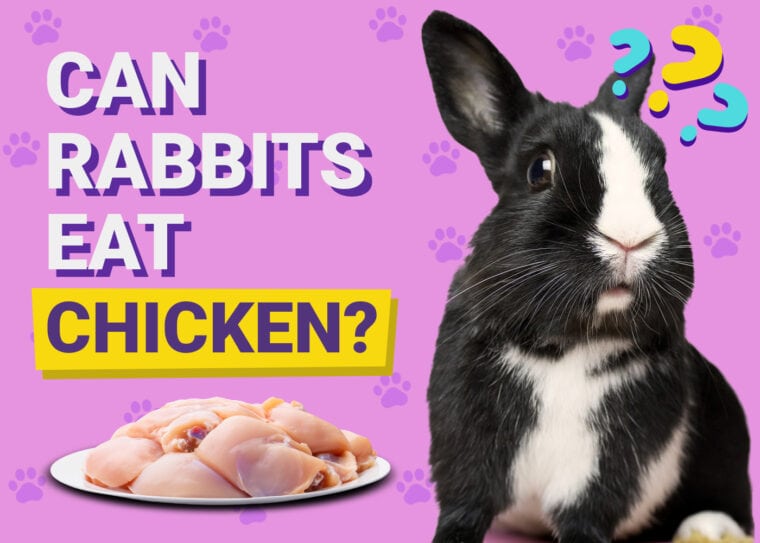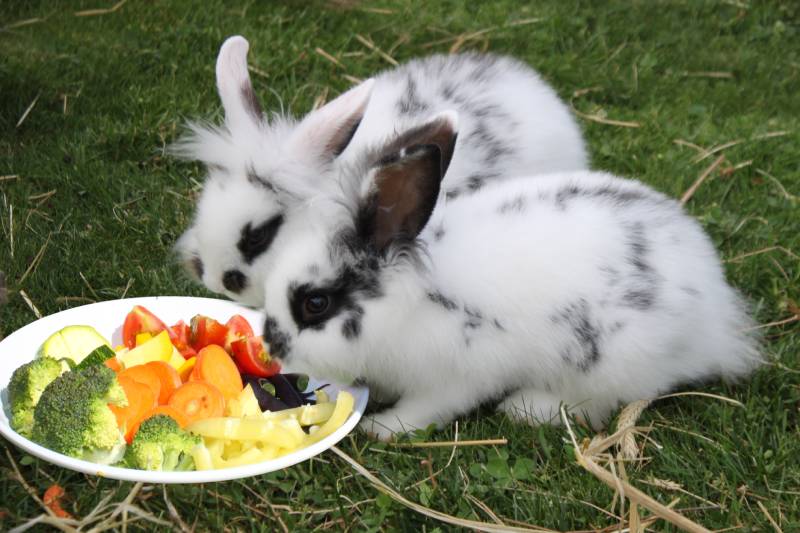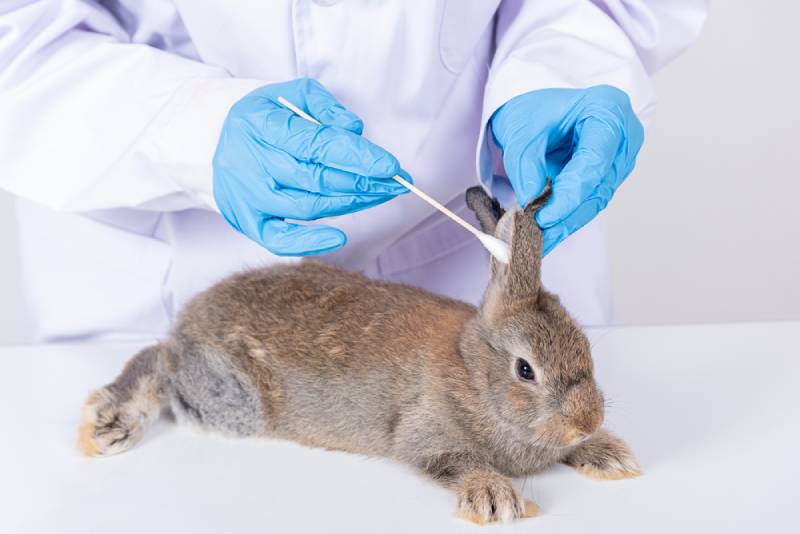
If you like to spend time with your bunny, you might want to eat your meals in their play area. But what if your rabbit ate chicken scraps that fell to the floor from your plate? If your bun ate a piece of chicken, would they be okay?
Rabbits should never eat chicken or any animal protein. They are not designed to eat meat, so there will be issues with digestion and overall health. They will likely be fine if they only ate a small amount, but you’ll need to keep an eye on them for any problems.
If you’re interested in learning more, here, we explain more about the rabbit’s diet and why meat is not recommended.
Why Rabbits Can’t Eat Meat
Rabbits are herbivores, which means they derive most of their nutrients from plants and vegetation to keep them alive and thriving. This also means their digestive systems cannot break down the proteins found in meat. Several medical conditions can occur if a rabbit eats meat.

Intestinal Blockage
When a rabbit does eat meat, their bodies will take a long time to digest it, potentially leading to a blockage in the intestinal tract. GI stasis is a condition in which normal digestion slows down or stops and can lead to food impaction in the intestines. It can also cause the rabbit to stop eating, exacerbating the problem. This can lead to the complete disruption of the digestive system, which can be fatal.
This typically occurs when a rabbit isn’t eating enough high-fiber food like timothy hay to help push the food through their digestive tract. Rabbits will likely suffer from GI stasis if their diet is too high in protein.
If your rabbit shows any of these signs, see your vet right away.
Diarrhea
Rabbits are prone to diarrhea if they are eating the wrong diet or if their diet is suddenly changed. If you plan on changing their diet to something new, it must be done gradually to prevent stomach upset.
Eating meat would qualify as both a sudden change and a bad diet, so it might cause diarrhea.

Uneaten Cecotropes
If you’re new to rabbit ownership, you should know that rabbits produce two kinds of droppings: cecotropes and fecal pellets.
Cecotropes are greenish-brown and dark and pressed into an elongated shape. If their cecotropes are healthy, a rabbit will eat them straight from their anus because they provide essential nutrients that are vital for the rabbit’s health.
Eating something that they shouldn’t, like chicken, will lead to soft cecotropes because of the high fat and protein and lack of fiber. If your rabbit isn’t eating their cecotropes, something is wrong, and you should see your vet.
What Rabbits Should Eat
Rabbits have a specific diet that they must eat to stay healthy. You shouldn’t assume anything about what rabbits eat, especially if you’re a new rabbit owner.
The main staple of a rabbit’s diet is hay/grass. Timothy hay is a favorite and highly recommended by rabbit owners. It must always be available to rabbits—about 80% of their diet should be hay. The rest of their diet should be about 10% vegetables, consisting primarily of dark, leafy greens. Good options are romaine lettuce, spinach, dandelion greens, and chicory, to name a few.
Pellets should be given sparingly and should only make up about 5% of the diet, and treats make up the last 5%. Treats are things like fruits that are safe for rabbits, such as bananas, grapes, and watermelon.
Besides the hay, all foods must be given in small amounts and just a few times a week. Also, rabbits need constant access to fresh, clean water.

Other Foods That Rabbits Shouldn’t Eat
What If Your Rabbit Ate Chicken?
If your rabbit only ate a small amount of chicken, it’s likely that there won’t be a problem. Wild rabbits have been known to eat their offspring if stressed or some of the young are sick.
Your rabbit should be fine as long as you aren’t regularly giving them chicken or any other meat. Keep an eye on them just to be on the safe side, though; look for any changes in their poop or if they start behaving differently. Call your vet if you’re concerned. They can give you suggestions and what to look out for if the chicken does affect your rabbit’s health.
But if your rabbit is still behaving normally and continuing to eat, you can give them extra hay, which can help push the chicken through their digestive system.
Final Thoughts
Chicken and any other animal meat should never be given to rabbits. If your rabbit eats a piece of chicken, you should keep an eye on them and speak to your vet, but they should be just fine.
Rabbits are herbivores, so they should only eat vegetation, particularly hay. The hay helps their digestion and keeps their teeth from overgrowing. Since rabbits are herbivores, it’s unlikely that they’ll be interested in meat, anyway.
So, if your rabbit did take a bite of chicken, check their behavior and their poop, and if there are any worrying changes, get in touch with your veterinarian.
Featured Image Credit: manfredrichter, Pixabay









